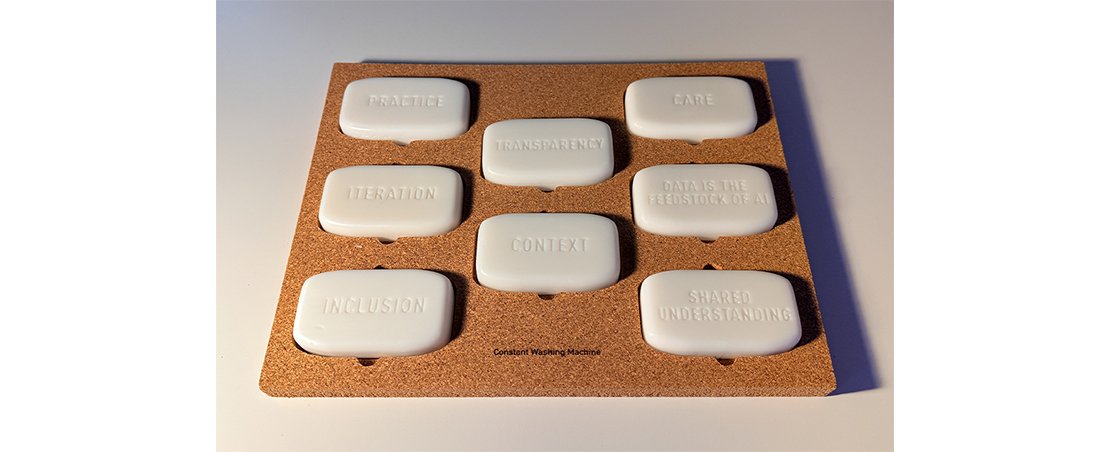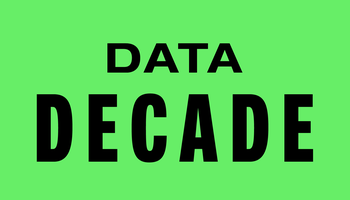
‘Constant Washing Machine’ is our latest commission, created by award-winning artists Blast Theory. On the premise that people who work with AI can employ consistent, everyday good practice in the responsible use of AI (RAI) through habit, Blast Theory proposes the simple human activity of washing and soap as a metaphor. Eight soap bars are embossed with key words and phrases associated with ‘Responsible AI’, to feature in a photography series and a performance.
The words and phrases are:
Practice | Iteration | Data is the feedstock of AI | Inclusion | Shared understanding | Context | Care | Transparency
Provoking human-centred habits, hygiene, and exchange in Responsible AI development, ‘Constant Washing Machine’ acts as a tangible and practical daily reminder for organisations to implement and manage their Responsible AI process and practice.
Blast Theory have been artists in residence, embedded within the University of Sheffield’s national research project FRAIM: Framing Responsible AI Implementation & Management. The artist's residency is curated by Data as Culture at the Open Data Institute for FRAIM, a Bridging Responsible AI Divides (BRAID) scoping project funded by the Arts and Humanities Research Council. The project partners are; The British Library, Eviden, Sheffield City Council and Open Data Institute (ODI). The wider aims of the project are to reshape views of ‘Responsible AI’ from simplistic solutions to dynamic processes and conversations, inviting everyone to consider their role in using and working with AI.
Soap as a metaphor
‘Constant Washing Machine’ responds to and reflects the complex web of ideas, perspectives, and people at the heart of ‘Responsible AI’ (RAI) practice. Blast Theory uses the metaphor of soap as a way to understand this because of its intimacy. We touch it to our bodies and spread it over the surface of our skin, and it is a social and everyday product when we share bars of soap with others. Multiple metaphors for using soap exist; we ‘wash our hands’ of something, we ‘greenwash’ things, we ‘clean the house’, we appear ‘squeaky clean’, and we ‘get ourselves in a lather’. These metaphors are a way to entwine the body and ethics into good RAI practice and can speak to otherwise slippery behaviour and slippery meanings. A call to those working within AI to commit to critical practices, it also acts as an accessible provocation to inspire national conversation.
Curator Hannah Redler-Hawes, Director of Data as Culture at the ODI said: “We were delighted to find project partners who share our belief in the essential thinking that art and artists bring to emerging data and AI ecosystems. Working across sectors with FRAIM has reinforced my view that AI can more accurately be thought about as a series of cultural shifts rather than simply a wave of technical innovations. Artists bring unique perspectives, and questions in relation to how we shape technologies and how they shape us. AI requires interdisciplinary thinking and collaboration. We hope ‘Constant Washing Machine’ helps more people understand what is meant by ‘Responsible AI’ and inspires them to think very deeply around the subject of ‘Responsible AI’ as a personal and collective activity.”
Responsible AI habits
A key concern of the FRAIM project is how ordinary people and everyday human behaviour shape AI’s positive and negative impacts. ‘Constant Washing Machine’ highlights the individuals and human beings working to shape and embed RAI in practice. The eight words and phrases that are embossed into the soap bars were selected as significant by the artists from suggestions proposed by FRAIM collaborators. The photographs will be portraits of each of the researchers with their selected key word or phrase.
By using this everyday human activity and material as metaphor, Blast Theory propose that the way forward with RAI is to move from ‘thinking’ into ‘doing’ as AI becomes part of our everyday lives. The artistic concept explores the nature of language, the slippery definitions of key terms in AI policies, and the role of organisational culture and daily conduct in forming ‘Responsible AI’ practices. The intention is that over time, the language will be wiped away as the soap is used, but the ‘Responsible AI’ habits will remain.
Matt Adams, Artist, Blast Theory said: "Is AI intelligent? Right from the start of the field in the 1950s it was controversial to use the word intelligence at all. We are fascinated by the slippery language used in the field and the proliferation of metaphors used to explain AI and machine learning. Large Language Models drive the current boom in AI but are they ‘intelligent’ in any sense, or are they just stochastic parrots capable of only aping what they have heard? Are the metaphors of parrots (or apes) helping us to grasp important concepts or just simplifying complex ideas into a palatable form? And how do we place our human selves in the loop? In ‘Constant Washing Machine’, we’re thinking about the machine in machine intelligence, the practice of washing and the hidden hygiene habits we use every day to keep things clean. ‘Responsible AI’ is enacted through our habits and culture more than by policies and procedures. We are inviting visitors to wash and in so doing, erase the words chosen: the knowledge is gained through repetition until the bar of soap is gone.”
Denis Newman-Griffis, Principle Investigator, FRAIM said: “The FRAIM project started from a simple question: What does it mean for AI to be used responsibly, and who is responsible for it? Our research has shown that the language of RAI is dangerously fluid, often meaning entirely different things to different people. As AI continues to become more mainstream, we need clear ways of thinking about the wide range of people who shape its impact—far beyond developers and regulators—and what it looks like to be responsible with AI in practice. Working with Blast Theory has given us a very different way of thinking about RAI and telling new stories to show that AI is about so much more than just technology. ‘Constant Washing Machine’ is a brilliant reflection on the ubiquity and everyday nature of near-future visions of AI and the role of everyday decisions and behaviour in determining when AI helps and when it harms.”
Susan Oman, Project co-lead and senior Lecturer in Data, AI and Society said: “The performative efforts of powerful actors to “ethics wash” bad systems, be these technical or social, are one of the biggest challenges for ‘Responsible AI’: the very term ‘Responsible AI’ is critiqued for discursive flattening of AI’s dangerous power asymmetries. Blast Theory’s ‘Constant Washing Machine’ brings the reflective, mundane, habitual practice of handwashing into dialogue with these concerns of ethics washing alongside the slipperiness of language, and allows us all to reflect on what shared understanding and responsibility for AI might be.”
Launch event
To launch the project, Blast Theory will host an event for people to wash their hands with ‘Constant Washing Machine’ soap artworks in a performative moment. Photographic documentation and sharing of the artwork online provide an immediate opportunity for the wider public to consider their role in using and working with AI. Further performances and installations are planned for the future.
For more information about FRAIM visit sheffield.ac.uk/fraim. ‘Constant Washing Machine’ will be documented on https://culture.theodi.org/ after the launch.
ODI Project team
Curator and Director Data as Culture: Hannah Redler-Hawes
Arts PR: Binita Walia, The Space inBetween


